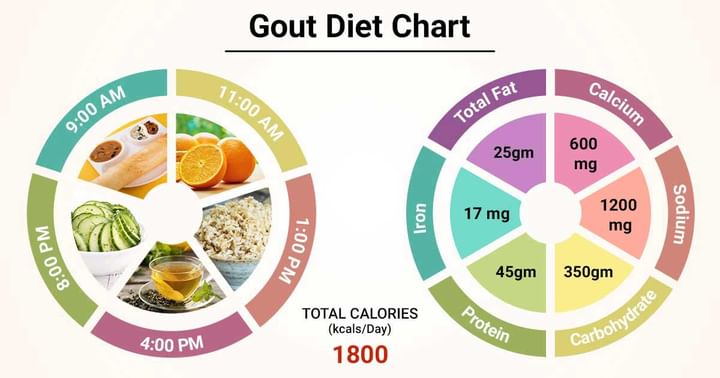Diet Chart For gout
Last Updated: Sep 04, 2019
About
A gout diet is specially constructed to reduce the risk of and manage gout. A gout is an extreme form of arthritis in which the accumulation of uric acid around the joints hurts the body’s movements. A gout diet decreases uric acid levels and maintains normal health. Keeping the weight in check is a method of protecting oneself from the onset of gout. Also, ingesting complex carbohydrates such as those found in fruits, vegetables and grains prove beneficial. Artificial sugar should be avoided. Meat and its products contain saturated fats that hinder metabolism and should not be included in the diet.
Protein should be consumed in moderation. Skimmed milk is known for its lower uric acid concentration and is a good substitute for other dairy products. It is a misconception that vegetables containing purine increase the probability of gout. Purine is the substance, which acts as a catalyst for the onset of gout. Purine-rich vegetables such as cauliflower, mushrooms, spinach, and peas do not increase the risk of gout and maintain the balance in a diet. A good dose of Vitamin C lowers uric acid levels. Citrus fruits rich in Vitamin C such as oranges, citrons, and lemons must be a part of the gout diet. Last but not least, keeping the body hydrated by drinking at least 8 glasses of water a day helps metabolism and keeps the body energized.
Diet Chart
| Sunday | |
| Breakfast (8:00-8:30AM) | 3 rice dosa+1/2 cup sambhar(lss dal)+1tsp methi chutney+1 glass milk(toned)/ 1 cup tea |
| Mid-Meal (11:00-11:30AM) | 1 medium size orange |
| Lunch (2:00-2:30PM) | 1 cup brown rice+2 jowar roti+aloo brinjal sabji+1/2 cup rasam+1 glass buttermilk |
| Evening (4:00-4:30PM) | 1 cup green tea+2-3 biscuits |
| Dinner (8:00-8:30PM) | 3 bajra roti+lauki methi curry+1/2 cup cucumber salad |
| Monday | |
| Breakfast (8:00-8:30AM) | 3 uthappam+2tsp methi chutney+1 glass milk/1 cup tea(toned) |
| Mid-Meal (11:00-11:30AM) | 1 banana |
| Lunch (2:00-2:30PM) | 1 cup brown rice+2 bajra roti+ 1/2 cup fenugreek buttermilk+1/2 cup french beans sabji |
| Evening (4:00-4:30PM) | 1 cup green tea+2-3 biscuits |
| Dinner (8:00-8:30PM) | 3 jowar roti+1/2 cup colocasia(arbi) curry+1/2 cup cucumber salad |
| Tuesday | |
| Breakfast (8:00-8:30AM) | 2 paratha(aloo/gobhi/methi) with 2 tsp green chutney+1 glass milk(toned)/ 1 cup tea |
| Mid-Meal (11:00-11:30AM) | 100gm pomegranate |
| Lunch (2:00-2:30PM) | 1 cup brown rice+2 bajra roti+1/2 cup fenugreek buttermilk+1/2 cup capsicum sabji |
| Evening (4:00-4:30PM) | 1 cup green tea+2-3 biscuits |
| Dinner (8:00-8:30PM) | 3 jowar roti+1/2 cup raw banana curry+1/2 cup cucumber salad |
| Wednesday | |
| Breakfast (8:00-8:30AM) | Vegetable sandwich with 4 whole wheat bread slices+cucumber,tomato, onion,spinach/lettuce+1 glass milk(toned)/ 1 cup tea |
| Mid-Meal (11:00-11:30AM) | 100 gm of pineapple |
| Lunch (2:00-2:30PM) | 1 cup brown rice+2 jowar roti+1/2 cup rasam+1/2 cup ivy gourd(parmal) sabji+1 glass buttermilk |
| Evening (4:00-4:30PM) | 1 cup green tea+2-3 biscuits |
| Dinner (8:00-8:30PM) | 3 bajra roti+1/2 cup tinda curry+ 1/2 cup cucumber salad |
| Thursday | |
| Breakfast (8:00-8:30AM) | 1 cup bajra upma with vegetables+1 glass milk/1 cup tea(toned) |
| Mid-Meal (11:00-11:30AM) | 100gm musk melon |
| Lunch (2:00-2:30PM) | 1 cup brown rice+2 jowar roti+1/2 cup snake gourd sabji+1/2 cup rasam+1 glass buttermilk |
| Evening (4:00-4:30PM) | 1 cup green tea+2-3 biscuits |
| Dinner (8:00-8:30PM) | 3 bajra roti+ 1/2 cup ridge gourd(thori) curry+1/2 cup cucumber salad |
| Friday | |
| Breakfast (8:00-8:30AM) | 4 rice Idly+ 1/2 cup sambhar(less dal)+1 tsp coconut chutney+1 glass milk(toned)/ 1 cup tea |
| Mid-Meal (11:00-11:30AM) | 1 medium size pear |
| Lunch (2:00-2:30PM) | 1 cup brown rice+2 jowar roti+1/2 cup rasam+1/2 cup cabbage sabji+1 glass buttermilk |
| Evening (4:00-4:30PM) | 1 cup green tea+2-3 biscuits |
| Dinner (8:00-8:30PM) | 3 bajra roti+1/2 cup bhindi curry+1/2 cup cucumber salad |
| Saturday | |
| Breakfast (8:00-8:30AM) | 1/2 cup cornflakes in 1 glass milk(toned) |
| Mid-Meal (11:00-11:30AM) | 1 medium size guava |
| Lunch (2:00-2:30PM) | 1 cup brown rice+2 bajra roti+1/2 cup fenugreek buttermilk +1/2 cup mooli sabji |
| Evening (4:00-4:30PM) | 1 cup green tea+2-3 biscuits |
| Dinner (8:00-8:30PM) | 3 jowar roti+1/2 cup cauliflower curry + 1 cup cucumber salad |
Food Items To Limit
- Red Meat: Red meat is one of the certain foods that deliver more uric acid than other foods in your diet. However, poultry and white meats, like pork are also high in the uric acid, so it is best to keep your intake of meats and wild meat to an overall minimum.
- Organ Meat: Like white and red meat, organ meats also deliver a high amount of the uric acid. Seafood: seafood and fish are off limits during gout flare-ups because they are other main sources of the uric acid (purines) in your diet.
- Beer & Alcohol: beer is twice as bad for people with gout than seafood and meats. That is because it will raise the production of the uric acid levels in the body and make the body more difficult to remove the excess uric acid.
- Drinks High in Sugar: These drinks deliver high fructose corn syrup that will stimulate the production of uric acid.
- Cauliflower: Cauliflower is a bland vegetable and is rich in the uric acid. They also have nutrients that can reduce insulin resistance that plays an important role in controlling the gout flare-ups.
- Protein rich vegetarian sources like soya, paneer, dals can also increase the tendency of increasing th blood uric acid levels.
- Mushrooms: mushrooms are considered to contain moderately high amount of uric acid.
Do's And Dont's
Do's:
- Eat more vegetables - add them at every meal.
- Drink plenty of water - you can become hungry when thirsty.
- Try eating off smaller plates so as to eat smaller portions
- Exercise between 30 minutes to one hour each day with moderate exercise - brisk walking, team sport, cycling or swimming.
Don'ts:
- Rely on soft drinks, sweetened cereals, cookies and cakes, donuts and pastries, chips, and confectionery to get you through the day.
- Don't skip meals. This will tempt you to snack
- Do not snack between meals.
- Avoid eating quickly. Sit and chew each bite.
- Don't eat more than two or three pieces of fruit per day.
- Avoid alcohol and other carbonated beverages.
- Avoid red meatt, organ meats, sea food.
Food Items You Can Easily Consume
- Cereals: Whole grains-rice, wheat,jowar, bajra
- Pulses: red gram, green gram, black gram, bengal gram Vegetables: all gourds-bitter gourd, snake gourd, ridge gourd, bottle gourd, ivy gourd, ladies finger, tinda,green leafy vegetables
- Fruits: banana, citrus fruits-orange, mousambi, grape fruit, lemon; berries-strawberry, blueberry, black berry; cranberry, cherries, papaya, pineapple.
- Milk and milk products: low fat milk, low fat curd.
Other beverages:
- coffee, green tea.
- Fish: salmon.
- Oil: 2 tbsp (30ml)
- Sugar: 2 tsp (10gm)
References
- Lee SJ, Terkeltaub RA, Kavanaugh A. Recent developments in diet and gout. Current opinion in rheumatology. 2006 Mar 1;18(2):193-8. [Cited 02 July 2019]. Available from:
- Zöllner N, Griebsch A. Diet and gout. InPurine Metabolism in Man 1974 (pp. 435-442). Springer, Boston, MA. [Cited 02 July 2019]. Available from:
- Kedar E, Simkin PA. A perspective on diet and gout. Advances in chronic kidney disease. 2012 Nov 1;19(6):392-7. [Cited 02 July 2019]. Available from:
Table of content
Find Dietitian/Nutritionist near me
Ask a free question
Get FREE multiple opinions from Doctors



